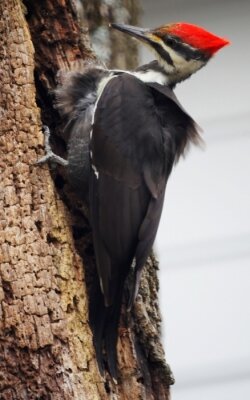Seeking comfort: When words fail, let nature do the talking
By BettyJoyce Nash
Last Friday, my friend and I talked and talked. Her words couldn't drown the chop-chop of the Black Hawks above her roof. We'd toss lines to each other, sometimes simultaneously, maybe-this, maybe-that, try to rationalize events, the unfathomable consequences.
Why were we bothering?
She'll be hearing that noise, in her head, for awhile. I'd visited her in Watertown less than a month ago, and I knew exactly where it was she said the authorities had set up shop. "Near the restaurant," she said. We'd feasted there, on herb-and-nut crusted tofu, less than a month ago. Later, I'd caught the bus to the Harvard Square T station.
"They knocked on the door," she said. "They wanted to know about the thing sticking out from under the truck–– the homemade oil pan."
She said she was looking out the window. "I don't know where the police go," she said, "They seem to disappear but every time I go outside, or open the door, there they are."
"Yeah, the helicopters are probably listening to our conversation," I said, staring outside my studio window, into a redbud-sprigged Virginia sky, marshmallowed with clouds, above a frog-clogged creek. "If only we could jazz it up. Say something racy."
The plea of a pileated woodpecker split the air.
"Yeah, if only I could think of something else."
"Yeah," I said, and the pileated joined our lament.
"Somewhere in the world, Boston happens every day," I said.
"I hate to think of little kids having to cope with these images," she said, "these events."
"Yeah." And why was yeah the only word I had to offer? I'm a writer for Twain's sake.
I tried to protect my boys, then 8 and 10, from 9/11 coverage. I didn't want them replaying the nightmare in their heads. But somehow, the news had sunk in. They played it out. That night they built with Legos, as always, but instead of transporting peanuts and raisins to their depot-stops by train, they built towers. They crashed planes into them. They rebuilt the towers, they knocked them over again. Heartbreaking play. We held them close. We talked over the tragedy, lamely.
Lame is the way to go when it comes to horror. Inarticulate is best when describing the unthinkable.
To which she replied, "Yeah, they canceled classes." Yes, the classes. Meetings. The devastated students. Families. The effects. On all of us.
Pressure cookers.
Nails.
Humble materials. Food and tools.
She and I traded inarticulate phrases, and I brought up The New York Times. What beautiful boys. I couldn't stop staring at that kid, Dzokhar's, photo. That dislocated kid. A mother's son. President Obama may have wondered the same thing when he said, "Why did young men who grew up and studied here, as part of our communities and our country, resort to such violence?"
My father wrote home, from "somewhere in France" during World War II: "The fireworks were beautiful that night too. It reminded me a little of the fireworks we used to see at the Southeastern Fair every year except with a much louder noise. Wasn't so nice, though, when daylight came and we could see dead Germans and [ ] everywhere."
Maybe Omaha Beach was where Dad honed the art of understatement. It wasn't nice. And that was the Good War. When censors could white-out "dead Americans" from letters home. When horrors weren't instantaneously branded into our brains. When the unthinkable wasn't broadcast around the globe instantly.
You'd think that the in-your-face nature of violence today would deliver us from evil. Or deliver us from caring.
It does neither.
The woodpecker called me back.
"I can't sleep," my friend said. "It's like a war zone."
We hung on to our sputtering conversation for a few fractured minutes. Finally I said, "Get some sleep." I walked outside, barefoot, and consulted the sky. Where was my pileated?
I wanted that bird.
BettyJoyce Nash is a local writer/editor.
